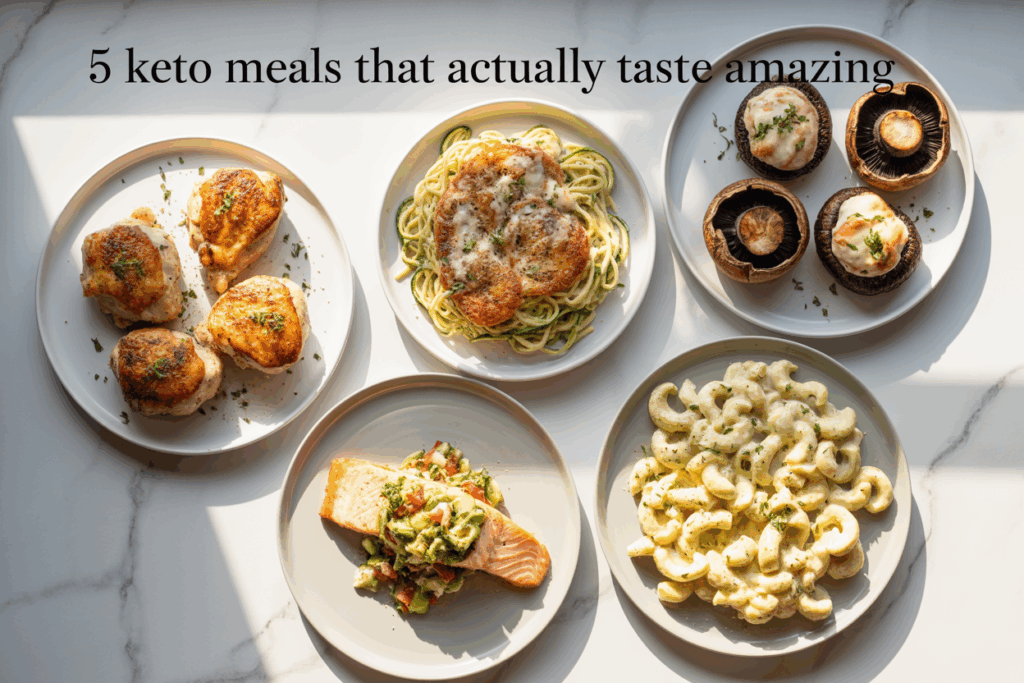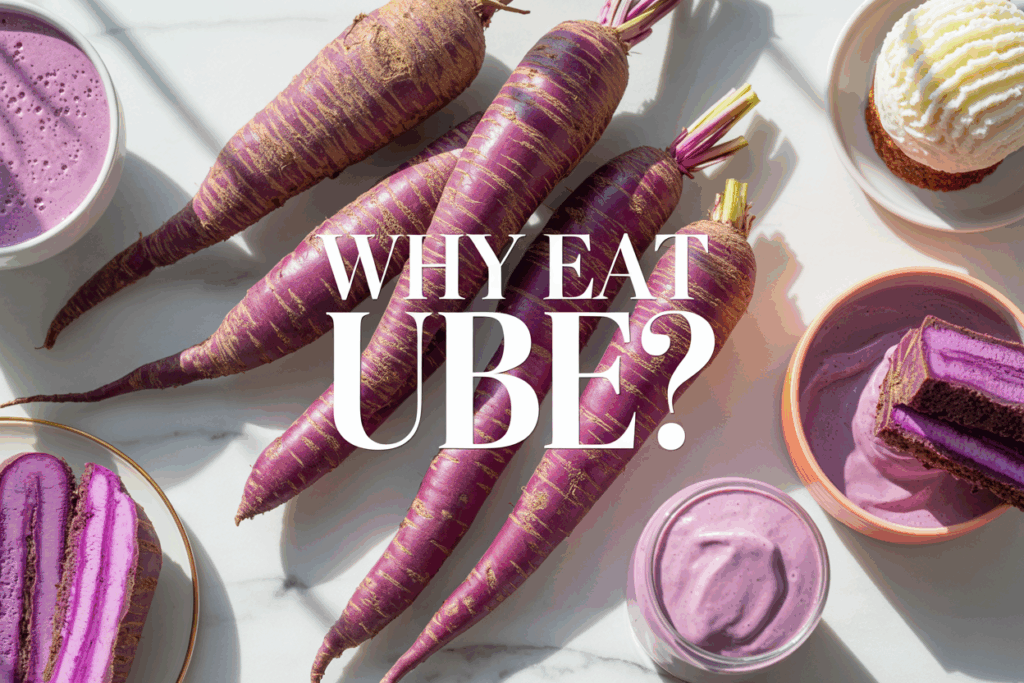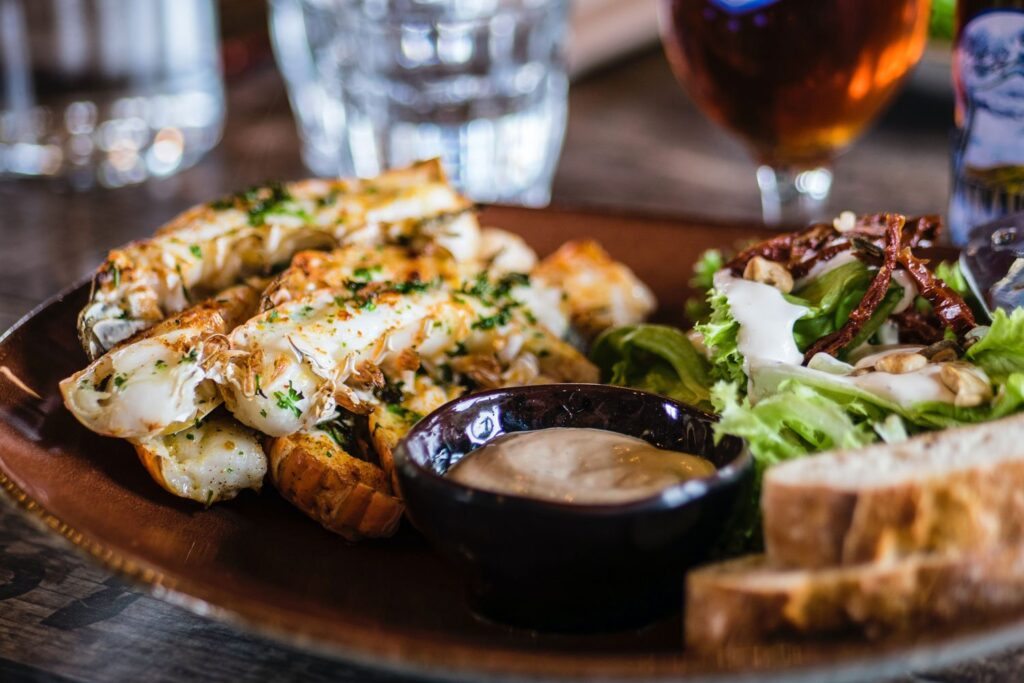Why we need to eat Ube?
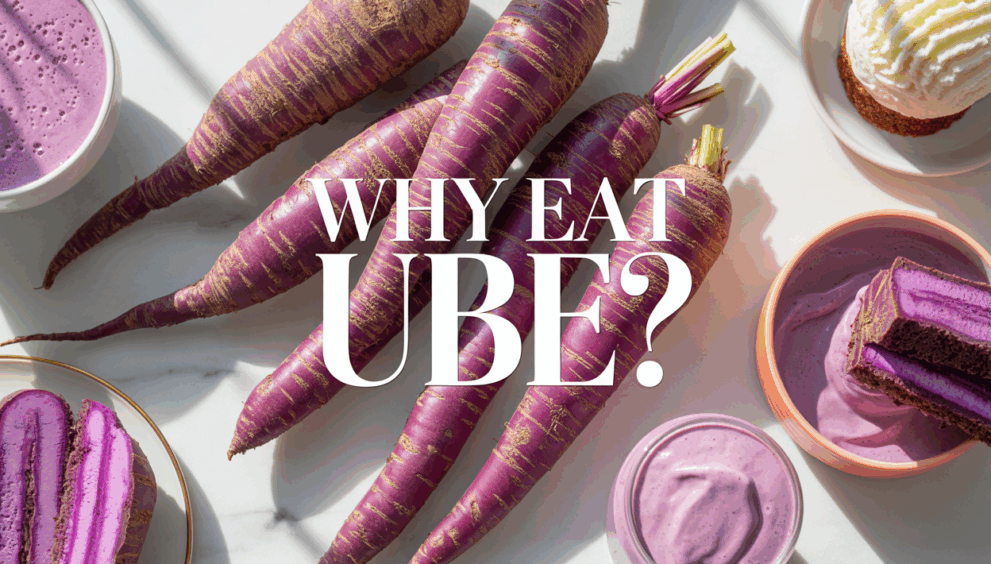
Ube isn’t just another trendy purple ingredient flooding your social media feed – this vibrant root vegetable packs serious health benefits that make it worth adding to your regular diet. If you’re curious about superfoods or looking to boost your nutrition naturally, ube delivers impressive results that go far beyond its Instagram-worthy color.
This guide covers why ube deserves a spot on your plate. We’ll explore how this nutritional powerhouse supports your immune system and helps with weight management. You’ll also discover how ube can enhance your skin health and learn simple ways to incorporate this versatile ingredient into your everyday meals.
Nutritional Powerhouse Benefits of Ube
High Antioxidant Content for Disease Prevention
Purple yams pack an incredible punch when it comes to antioxidants, making them one of the most powerful foods you can add to your diet. The deep purple color isn’t just for show – it signals the presence of potent compounds that fight off harmful free radicals in your body. These antioxidants work around the clock to protect your cells from damage that can lead to chronic diseases, premature aging, and even cancer.
What makes ube particularly special is its ORAC value (Oxygen Radical Absorbance Capacity), which measures antioxidant strength. Studies show that purple yams score significantly higher than many other colorful vegetables, putting them in the same league as blueberries and dark leafy greens. The antioxidants in ube help neutralize oxidative stress, which is basically your body’s version of rust – the slow damage that accumulates over time.
Regular consumption of antioxidant-rich foods like ube has been linked to reduced risk of heart disease, certain cancers, and neurodegenerative conditions like Alzheimer’s. Your body naturally produces some antioxidants, but getting extra support from nutrient-dense foods gives your cellular defense system the backup it needs to stay strong.
Rich Vitamin and Mineral Profile
Ube delivers an impressive array of essential nutrients that your body craves for optimal function. This purple powerhouse contains substantial amounts of vitamin C, which supports immune function and collagen production for healthy skin. Just one serving provides a meaningful portion of your daily vitamin C needs, rivaling many citrus fruits.
The mineral content is equally noteworthy. Ube is loaded with potassium, an electrolyte that helps regulate blood pressure and supports proper muscle and nerve function. Many people don’t get enough potassium in their diets, making ube an excellent way to bridge that gap naturally.
| Nutrient | Amount per 100g | Benefits |
|---|---|---|
| Vitamin C | 17mg | Immune support, skin health |
| Potassium | 816mg | Blood pressure regulation |
| Manganese | 0.4mg | Bone health, metabolism |
| Vitamin B6 | 0.3mg | Brain function, energy |
| Magnesium | 24mg | Muscle function, sleep |
The B-vitamin complex in ube, particularly B6, plays a crucial role in brain health and energy metabolism. Magnesium supports muscle relaxation and better sleep quality, while manganese helps with bone formation and wound healing. This diverse nutrient profile makes ube a true superfood that addresses multiple health needs simultaneously.
Dietary Fiber for Digestive Health
Your digestive system will thank you for including ube in your meals. This purple tuber contains both soluble and insoluble fiber, creating the perfect combination for optimal gut health. The fiber content helps maintain regular bowel movements, prevents constipation, and feeds the beneficial bacteria in your digestive tract.
Soluble fiber in ube forms a gel-like substance in your stomach, which slows down digestion and helps you feel satisfied longer. This type of fiber also helps stabilize blood sugar levels by preventing rapid spikes after meals. The insoluble fiber adds bulk to your stool and promotes healthy elimination, keeping your digestive system running smoothly.
The prebiotic properties of ube fiber deserve special attention. These compounds serve as food for your gut microbiome – the trillions of beneficial bacteria that live in your intestines. A healthy gut microbiome has been connected to better mood, stronger immunity, and even improved mental clarity. By nourishing these microscopic allies, you’re investing in your overall well-being.
Regular fiber intake from whole foods like ube can help reduce cholesterol levels and support healthy weight management. The fiber helps you feel full on fewer calories while providing sustained energy throughout the day.
Natural Anthocyanins for Heart Health
The vibrant purple hue of ube comes from anthocyanins – powerful plant compounds that offer remarkable benefits for your cardiovascular system. These natural pigments act as potent anti-inflammatory agents, helping to reduce inflammation in blood vessels and throughout your body. Chronic inflammation is a key contributor to heart disease, so getting natural anti-inflammatory compounds from foods like ube can be protective.
Research shows that anthocyanins help improve blood vessel flexibility and function, making it easier for blood to flow efficiently throughout your body. This improved circulation can lead to better oxygen delivery to your organs and tissues, supporting overall vitality and energy levels.
The heart-protective effects extend to cholesterol management as well. Anthocyanins have been shown to help maintain healthy cholesterol ratios by supporting the breakdown of LDL (bad) cholesterol while preserving HDL (good) cholesterol levels. This dual action helps keep your arteries clear and reduces the risk of cardiovascular complications.
Studies have found that people who regularly consume anthocyanin-rich foods have lower rates of heart disease and stroke. The compounds also support healthy blood pressure levels by promoting the production of nitric oxide, a molecule that helps blood vessels relax and dilate properly.
Immune System Boosting Properties
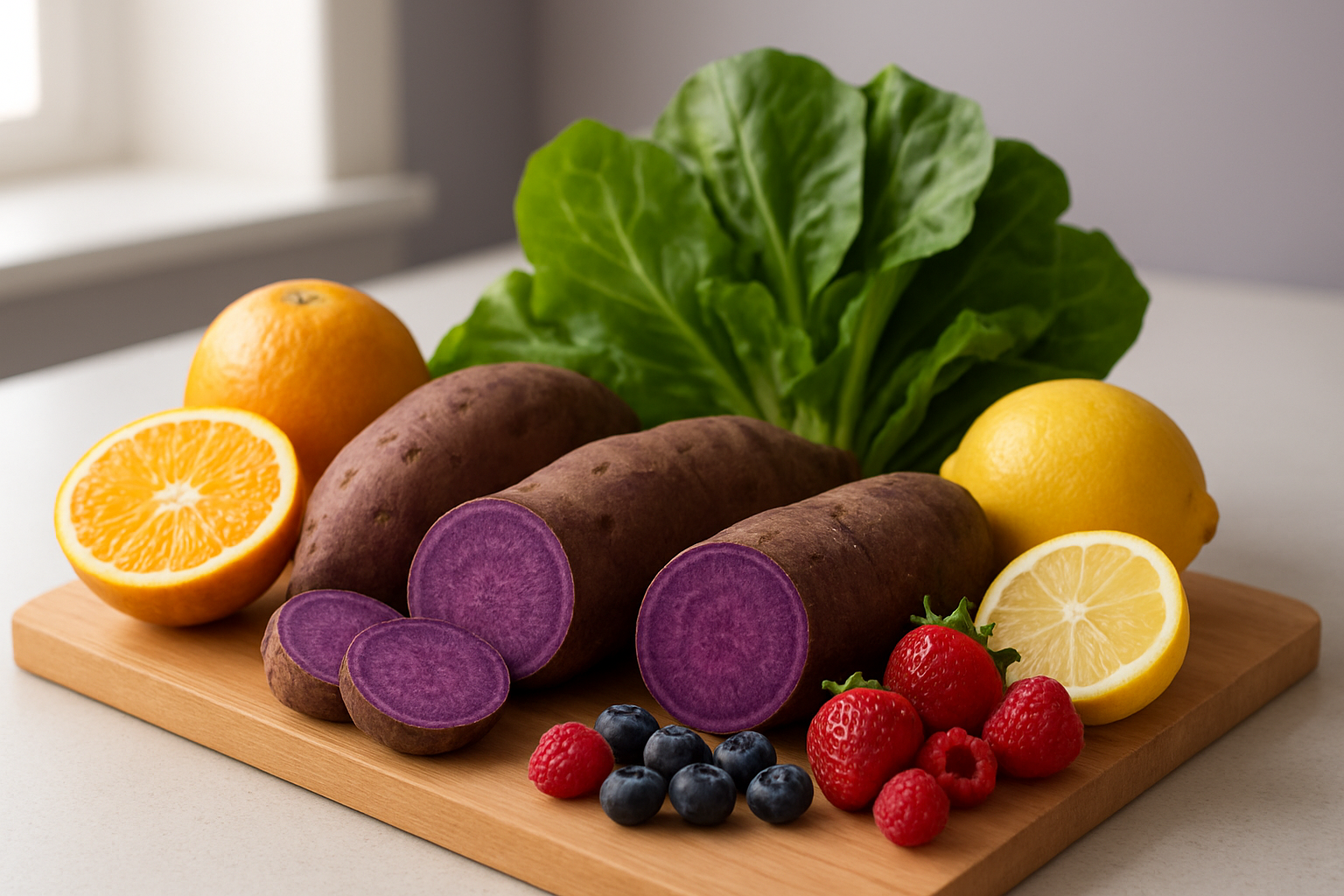
Vitamin C Content for Enhanced Immunity
Ube packs a serious vitamin C punch that puts many other foods to shame. A single serving delivers approximately 30-40% of your daily vitamin C requirement, making it a powerhouse for immune system support. This essential nutrient acts as your body’s first line of defense, strengthening white blood cells and helping them function more effectively against pathogens.
What makes ube’s vitamin C particularly valuable is its bioavailability – your body can easily absorb and use it compared to synthetic supplements. The natural form found in ube works synergistically with other compounds in the purple yam, creating a more potent immune-boosting effect. Regular consumption helps maintain consistent vitamin C levels in your bloodstream, providing ongoing protection rather than temporary spikes.
The vitamin C in ube also supports collagen production, which strengthens the barriers in your respiratory tract and digestive system – your body’s entry points where infections typically begin. This dual action of internal immune support and physical barrier strengthening makes ube an exceptional choice for year-round health maintenance.
Anti-inflammatory Compounds
The deep purple color of ube signals the presence of powerful anthocyanins, natural compounds that wage war against inflammation in your body. These plant pigments don’t just make ube visually striking – they actively reduce inflammatory markers that can compromise immune function and overall health.
Chronic inflammation weakens your immune system over time, making you more susceptible to infections and slower to recover. Ube’s anti-inflammatory compounds help reset this balance, allowing your immune system to focus on real threats rather than fighting constant internal inflammation.
Research shows that anthocyanins in purple vegetables like ube can reduce inflammatory proteins in the bloodstream by up to 25% when consumed regularly. These compounds specifically target:
- Cytokine reduction: Lowering inflammatory messaging between cells
- Joint health: Reducing inflammation in connective tissues
- Cardiovascular support: Decreasing inflammation in blood vessels
- Digestive wellness: Calming inflammatory responses in the gut
The anti-inflammatory benefits work best when ube is consumed consistently rather than occasionally, as these compounds build up in your system over time.
Natural Defense Against Free Radicals
Free radicals constantly attack your cells, weakening your immune system and accelerating aging. Ube serves as your personal bodyguard against this cellular damage through its impressive antioxidant profile. The purple yam contains multiple types of antioxidants that work together like a specialized defense team.
Beyond anthocyanins, ube provides betalains and phenolic compounds that neutralize different types of free radicals. This diverse antioxidant arsenal means your cells get comprehensive protection rather than defense against just one type of oxidative stress.
The ORAC (Oxygen Radical Absorbance Capacity) score of ube rivals that of blueberries and other superfruits, yet it remains an underutilized nutritional powerhouse. Regular ube consumption helps:
| Antioxidant Benefit | Impact on Immunity |
|---|---|
| DNA Protection | Prevents genetic damage that weakens immune cells |
| Mitochondrial Support | Maintains energy production in immune cells |
| Membrane Stability | Protects cell walls from oxidative damage |
| Protein Preservation | Keeps immune proteins functioning optimally |
Your immune cells are particularly vulnerable to free radical damage because they work so hard fighting infections. Ube’s antioxidants essentially give these hardworking cells the protection they need to stay strong and effective, creating a positive cycle of enhanced immunity and better overall health.
Weight Management and Metabolic Benefits
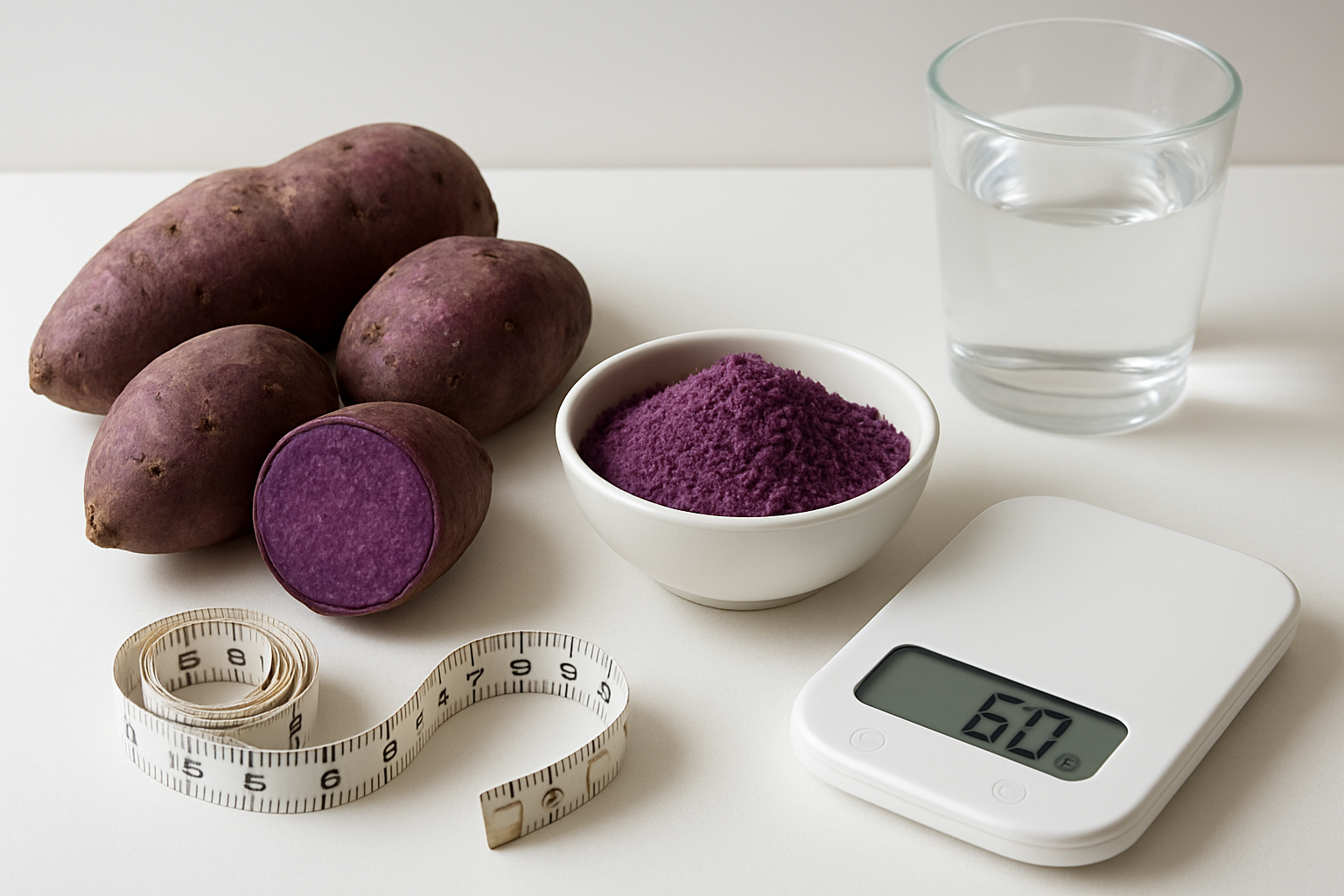
Low Calorie Dense Nutrition
Ube delivers impressive nutritional value while keeping calories surprisingly low. A 100-gram serving contains only about 118 calories, making it an excellent choice for anyone watching their caloric intake. What makes this purple root vegetable particularly valuable is its nutrient density – you get substantial amounts of vitamins, minerals, and fiber without the caloric burden of many other starchy foods.
The secret lies in ube’s natural water content and fiber composition. Unlike processed snacks or refined carbohydrates that pack calories without much nutritional benefit, ube provides essential nutrients including vitamin C, potassium, and manganese while keeping portion sizes satisfying. This means you can enjoy larger servings without derailing your weight management goals.
Blood Sugar Regulation Properties
Ube’s complex carbohydrate structure makes it a smart choice for maintaining stable blood sugar levels. The natural fiber content slows down glucose absorption, preventing the sharp spikes and crashes associated with simple sugars and refined foods. This steady glucose release helps your body maintain consistent energy levels throughout the day.
Research shows that foods with lower glycemic indices, like ube, can improve insulin sensitivity over time. When your blood sugar remains stable, your body produces less insulin, which reduces the likelihood of storing excess glucose as fat. This metabolic advantage makes ube particularly beneficial for people managing diabetes or prediabetes, while also supporting weight management efforts in healthy individuals.
Sustained Energy Release
The fiber and resistant starch in ube work together to provide long-lasting energy. Unlike quick-burning carbohydrates that leave you feeling hungry again within hours, ube’s complex carbohydrate profile ensures your energy levels remain consistent for extended periods. This sustained release pattern helps prevent the energy crashes that often lead to unhealthy snacking.
Athletes and active individuals particularly benefit from ube’s energy profile. The steady glucose release supports endurance activities without causing digestive distress. Whether you’re powering through a workout or managing a busy workday, ube provides the fuel your body needs without the rollercoaster effect of simple carbohydrates.
Appetite Control Benefits
Ube’s high fiber content plays a crucial role in appetite regulation. Fiber expands in your stomach, creating a feeling of fullness that naturally reduces overall food intake. A single serving of ube contains about 3 grams of fiber, which contributes to the recommended daily intake while promoting satiety.
The combination of fiber and complex carbohydrates triggers the release of hormones like GLP-1 and PYY, which signal fullness to your brain. These natural appetite suppressants help you feel satisfied longer between meals, reducing the likelihood of overeating or reaching for unhealthy snacks. This biological response makes ube an effective tool for portion control and long-term weight management success.
Skin and Beauty Enhancement Effects
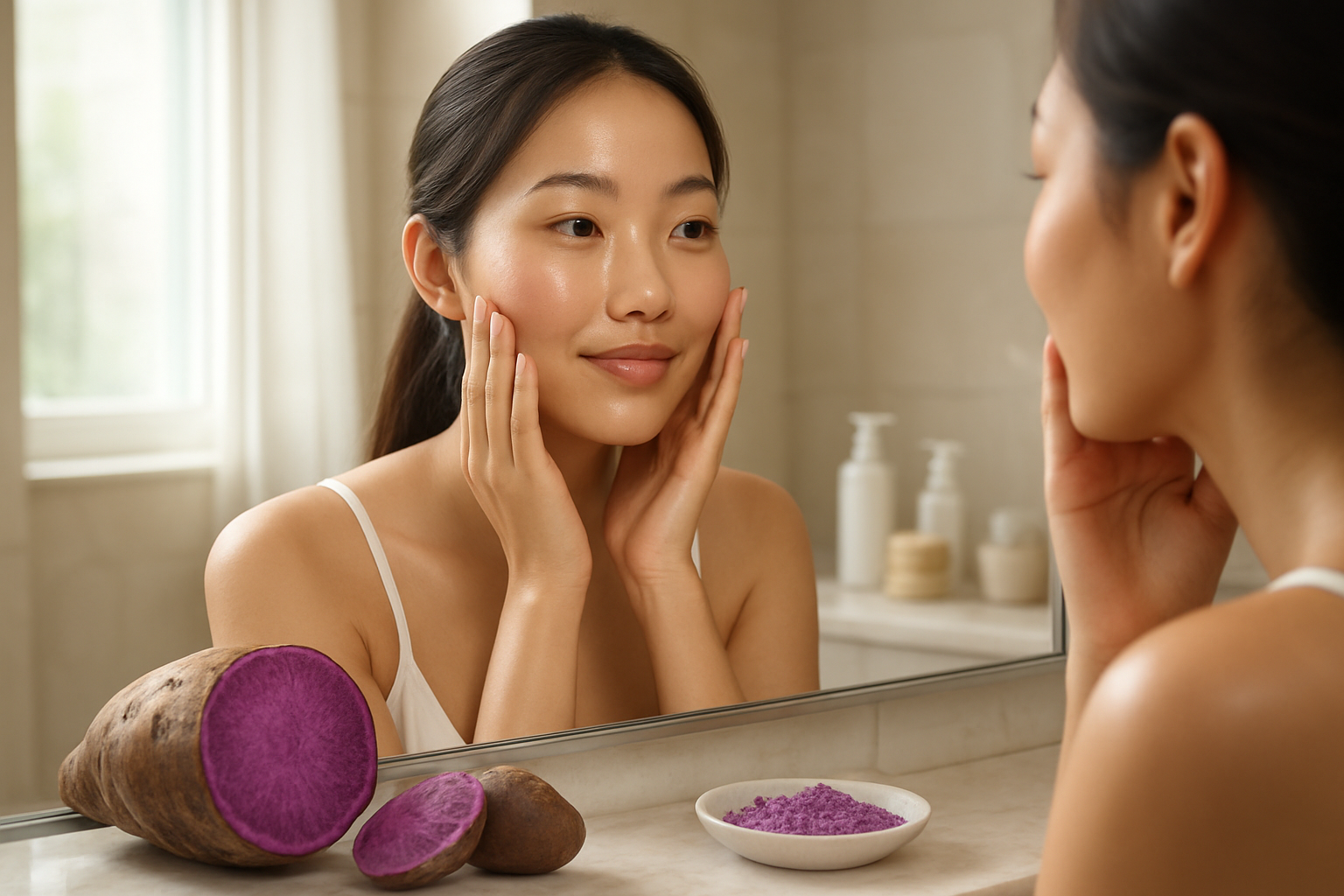
Collagen Production Support
Ube contains vitamin C and anthocyanins that work together to boost your body’s natural collagen production. Your skin relies on collagen to maintain its firmness, elasticity, and youthful appearance. When you eat ube regularly, you’re giving your body the building blocks it needs to create more collagen from the inside out.
The purple pigments in ube, called anthocyanins, protect existing collagen from breaking down while supporting the formation of new collagen fibers. These powerful compounds also improve blood circulation to your skin, delivering nutrients more effectively to skin cells. This enhanced circulation helps your complexion look brighter and more radiant.
Ube’s high vitamin C content plays a crucial role in collagen synthesis. Your body can’t produce collagen without adequate vitamin C, making ube an excellent natural source for maintaining healthy skin structure. Just one serving provides a significant portion of your daily vitamin C needs.
Anti-aging Properties
The antioxidants in ube fight free radicals that cause premature aging and wrinkles. These unstable molecules damage skin cells and break down collagen, leading to fine lines and age spots. Ube’s rich purple color comes from potent antioxidants that neutralize these harmful compounds before they can damage your skin.
Regular consumption of ube helps reduce visible signs of aging by protecting cellular DNA and promoting skin repair. The beta-carotene in ube converts to vitamin A in your body, supporting skin cell turnover and revealing fresher, younger-looking skin underneath.
Studies show that foods rich in anthocyanins like ube can improve skin texture and reduce the appearance of wrinkles over time. The anti-inflammatory properties also help calm irritated skin and reduce redness, creating a more even complexion.
Natural Skin Protection
Ube acts as edible sunscreen by providing natural protection against UV damage. The anthocyanins and other antioxidants create a protective barrier within your skin cells, reducing the harmful effects of sun exposure from the inside out.
The natural compounds in ube help strengthen your skin’s defense mechanisms against environmental stressors like pollution, harsh weather, and oxidative stress. This internal protection complements your external skincare routine, creating a comprehensive approach to skin health.
Eating ube regularly helps maintain your skin’s natural moisture barrier, preventing dryness and keeping your complexion hydrated and supple. The nutrients support healthy oil production, helping balance both dry and oily skin types naturally.
Versatile Culinary Applications and Accessibility
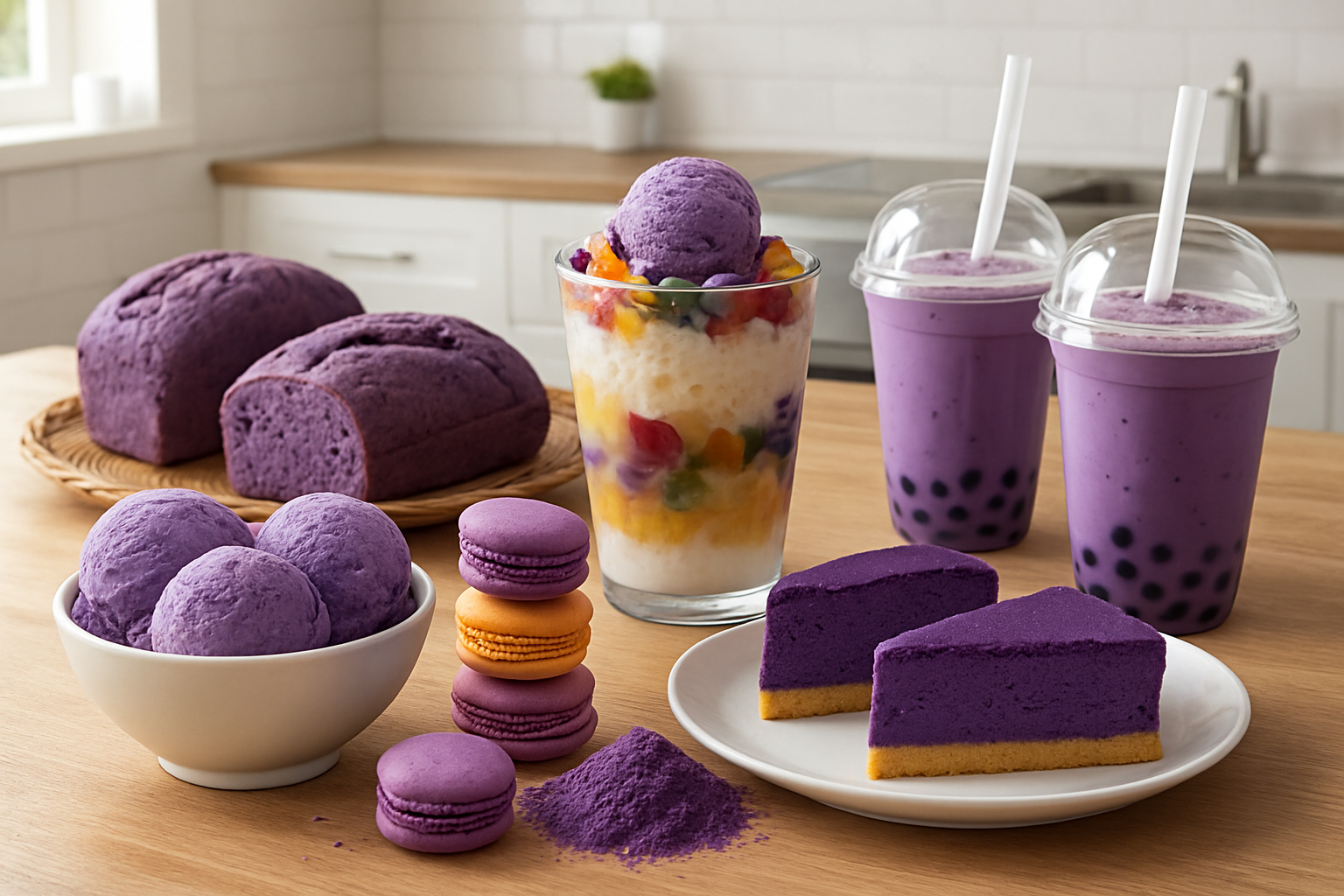
Easy Integration into Daily Meals
Ube’s naturally mild, sweet flavor makes it surprisingly easy to incorporate into everyday cooking. You can simply substitute regular potatoes with fresh ube in many recipes – try mashing it as a colorful side dish or adding cubed ube to soups and stews. The purple root vegetable works beautifully in breakfast dishes too. Blend cooked ube into pancake batter for vibrant morning treats, or mix it into oatmeal for extra nutrients and natural sweetness.
For busy schedules, ube powder offers incredible convenience. Just a tablespoon mixed into smoothies, yogurt bowls, or even scrambled eggs adds both nutrition and visual appeal. The powder dissolves easily and doesn’t overpower other flavors. Many home cooks find success adding grated fresh ube to rice dishes, creating stunning purple-hued meals that taste as good as they look.
The versatility extends to savory applications where ube’s earthy undertones shine. Consider using it in curry dishes, roasted vegetable medleys, or as a base for creamy pasta sauces. The natural purple color transforms ordinary meals into Instagram-worthy creations without requiring special cooking skills.
Dessert and Beverage Options
The dessert world has embraced ube with incredible creativity. Traditional Filipino treats like ube halaya showcase the ingredient’s natural sweetness, while modern adaptations include ube ice cream, cheesecakes, and macarons. The vibrant purple color makes these desserts instant conversation starters at gatherings.
Ube’s creamy texture when cooked makes it perfect for no-bake desserts too. Blend cooked ube with coconut cream for quick puddings, or fold it into whipped cream for stunning cake fillings. The natural sweetness means you can often reduce added sugars in recipes.
Beverage applications are equally exciting. Ube lattes have become coffee shop favorites, offering a caffeine kick with antioxidant benefits. Smoothie enthusiasts love combining ube with coconut milk, banana, and vanilla for tropical-flavored drinks. Even simple ube milk tea provides a unique alternative to typical bubble tea flavors.
For those avoiding dairy, ube works wonderfully in plant-based desserts and drinks. The ingredient’s natural creaminess helps create rich textures without relying on heavy cream or butter.
Growing Market Availability
Finding ube has become much easier as mainstream grocery stores recognize consumer demand. Major chains now stock frozen ube, ube extract, and ube powder in their international or specialty sections. Asian grocery stores remain the best source for fresh ube roots, offering multiple varieties and often at better prices than conventional supermarkets.
Online retailers have revolutionized ube accessibility. Fresh ube ships well when properly packaged, and many specialty food websites offer subscription services for regular deliveries. Ube powder and extract have particularly strong online availability, with options ranging from organic to conventional processing methods.
The ingredient’s popularity has sparked local farming initiatives in suitable climates. Some US farmers now grow ube commercially, reducing import costs and ensuring fresher products. Farmers’ markets in diverse communities increasingly feature ube from local growers.
Restaurant menus showcase ube’s mainstream acceptance. Filipino restaurants naturally lead this trend, but fusion establishments, dessert shops, and even fast-casual chains now feature ube items. This restaurant presence helps introduce newcomers to the ingredient while creating demand that supports retail availability.
Food manufacturers have responded with pre-made ube products, from frozen desserts to baking mixes, making it easier than ever for home cooks to experiment with this nutritious purple powerhouse.
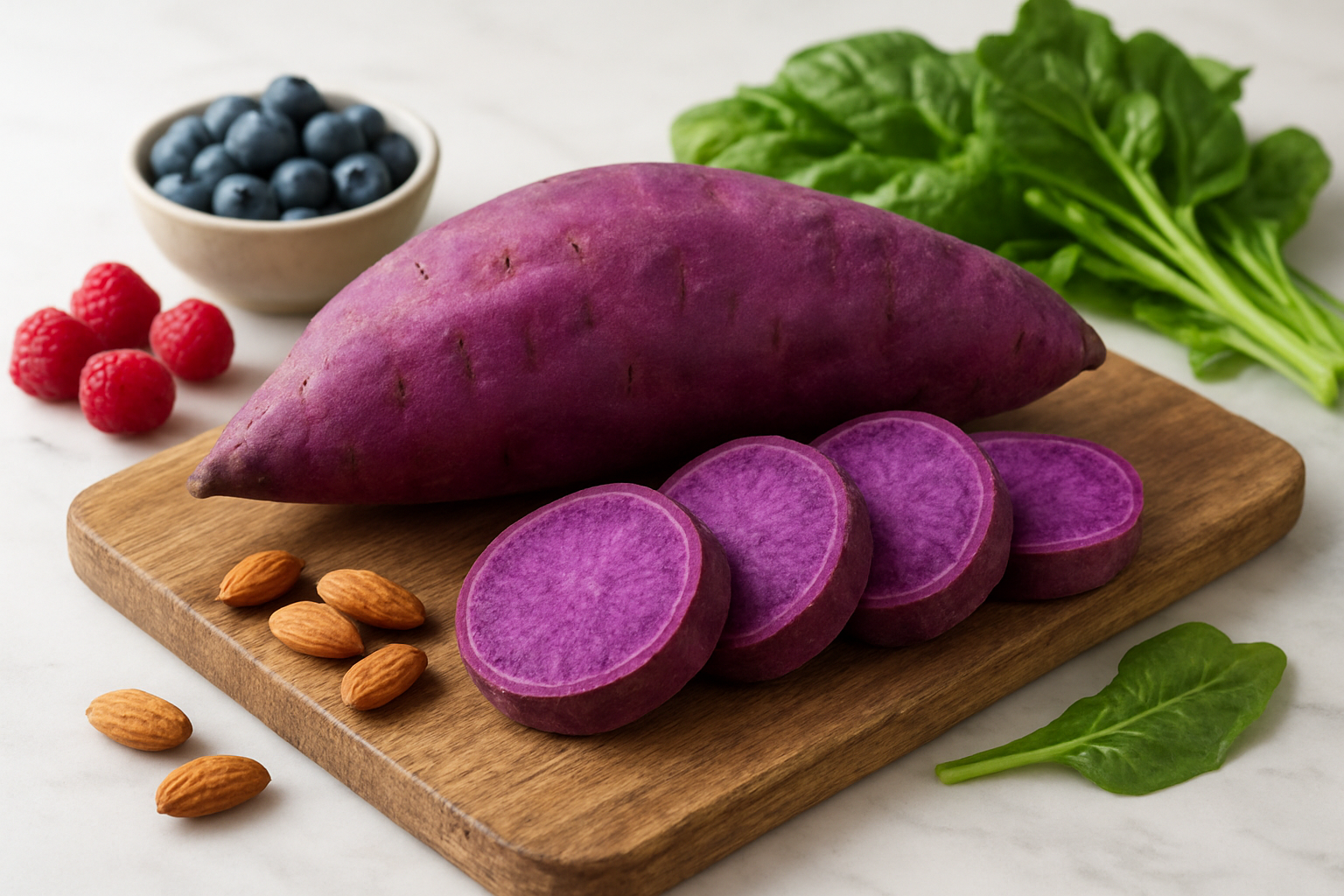
Ube isn’t just another trendy superfood – it’s a nutritional powerhouse that deserves a permanent spot in your kitchen. This vibrant purple yam brings serious health benefits to the table, from boosting your immune system and supporting healthy weight management to giving your skin that natural glow we all want. The antioxidants packed into every bite work overtime to protect your body while keeping your metabolism running smoothly.
The best part? You don’t need to be a master chef to enjoy ube’s benefits. Whether you’re blending it into smoothies, baking it into desserts, or simply roasting it as a side dish, this versatile ingredient adapts to whatever cooking style you prefer. With more grocery stores stocking ube products and fresh yams becoming easier to find, there’s never been a better time to give this colorful superfood a try. Your taste buds and your body will thank you for making the switch.
 English
English 

